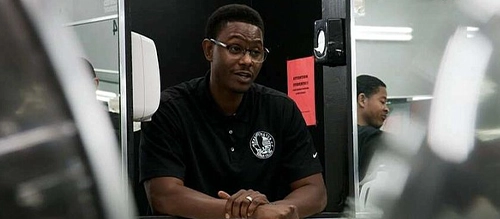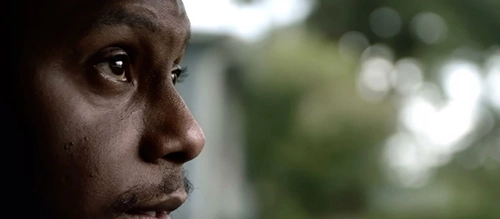
The Barber of Little Rock (2023)
Directors: John Hoffman, Christine Turner
Starring: Arlo Washington
Documentary filmmaker John Hoffman, known for such films as Fauci (about Dr Anthony Fauci, the man who led the United States against pandemics for decades), and activist filmmaker Christine Turner, known for such films as Lynching Postcards: ‘Token of a Great Day’ (about the killing of African Americans at the hands of white mobs in the 19th and 20th centuries), combine their talents and perspectives for 2024 Oscars nominee The Barber of Little Rock, the Documentary Short of one black man’s mission to breach the racial wealth gap in the USA.
The Barber of Little Rock sports high production values from the off, introducing its story with a drone shot of the Arkansas State Capitol and punctuating its ultra-modern on-the-ground presentation with talking heads photographed in a warm colour palette with all the intimacy one might expect from a film of this type. It presents the story of Arlo Washington, and particularly the non-profit community bank he founded, People Trust. Washington is a barber using his qualifications and know-how to help give people usable life skills that can help them move forward with their lives, whilst People Trust is a vital community source of financial aid should those with bad credit scores need a cash injection for a small business, or a vital grant to pay their rent with.
As with any great documentary, a great subject makes a great story, and Arlo Washington is certainly a great subject. We’re not given his life story immediately, but it is one that he meets with grace and gratitude despite its relative tragedy, and it does colour him as a leader of men. He is a motivated, forward-thinking individual, working within the confines of what he considers a racist system of financial oppression to bring money to the areas without it.
There is one moment in which Washington is recorded driving through town with a client, and it is explained that one of the predominantly black areas of Little Rock has 30,000 citizens and zero banks, whilst the white area has just 15,000 citizens and fifteen banks. Washington and People Trust are looking to restore the balance. In a country where white people have, on average, seven times the income of black people, it’s a noble pursuit that has evidently already breathed new life into the community and helped to get many people believing in the possibility of what they consider a free life.

It is explained in the documentary that 95% of all people that Washington and People Trust provide loans to pay them back on time, a uniquely high number that speaks of the humanity that Washington and his staff approach their customers with. We see throughout the documentary a number of people given grants to get started post-incarceration, to pay for increased rent whilst they look for somewhere new to live, to afford something vital for themselves or their business, and then we see them in the talking heads segments explaining how vital that was to helping them believe in themselves, to helping them believe there might be something in this world for them after a lifetime of financial and societal oppression, both loud and whispered.
There is a clear intent by the filmmakers to celebrate the community-driven efforts of Washington and People Trust, and as such The Barber of Little Rock lacks the interrogation you might find elsewhere. We are given a brief title card to explain how People Trust is re-circulating traditional bank money to new areas, but the film avoids expanding upon that or questioning it in any way. The film is partly funded by PayPal, but there is little self-awareness or self-evaluation regarding this fact. It is also clear that their intention to highlight this story as one of good-will and sticking it to the man made them unwilling to engage with naysayers or critics, even ones that might be untrustworthy, leaving the documentary short in terms of a complete evaluation of the People Trust.
Buying into a system that has historically oppressed so many is a tough sell, and The Barber of Little Rock could have benefitted from ensuring that the journey from a stance of opposition to one of embrace was better told throughout its runtime. But you will learn something watching this film. Whether it’s a specific fact that doesn’t get circulating in mainstream news or a life story that humanises the figures you’ve already heard about, The Barber of Little Rock will give you something worth sharing with a friend or loved one, and will encourage those with open minds to open them just a little bit more. This is a documentary about a subject, racial financial segregation, that should not exist in 2024, and yet it is positive and hopeful. The world could do with more people like Arlo Washington, and perhaps The Barber of Little Rock will be the catalyst for more coming to prominence.
Score: 18/24

